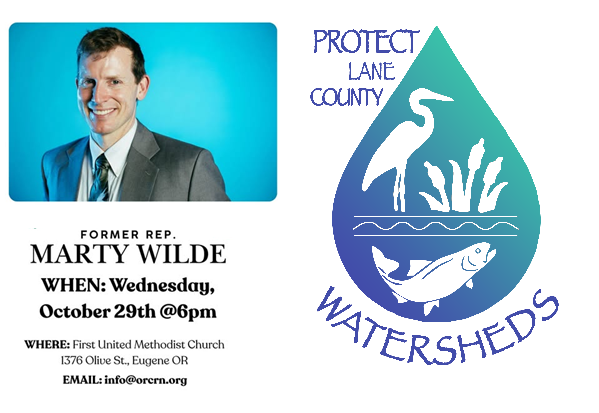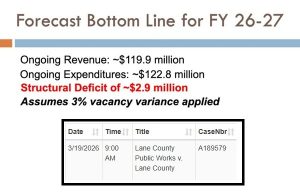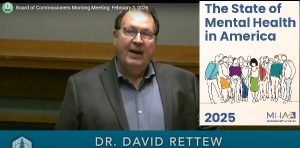Marty Wilde to discuss ‘unfinished business’ Oct. 29
7 min read
Presenter: Marty Wilde will be speaking this Wednesday, Oct. 29 at 6 p.m, First United Methodist Church. His topic is ‘Unfinished Business – Three Steps to an Oregon Legislature That Works for the People.’
Marty Wilde: They invited me on this one ’cause of my experiences in legislature, how to get the legislature more reflective of the people’s interests: campaign finance reform, nonpartisan redistricting, and open primaries. Those are the three.
[00:00:27] I came to those fairly early in my career when I realized that my experience, I think I knocked on 11,000 doors in my first campaign and most people knock on 1,000 or fewer.
[00:00:36] And I don’t know how you can represent people if you don’t know them. And the way you get to know ’em is by going out and meeting them. It doesn’t have to be through door-knocking. It can be through town halls or whatever but that’s a good way to do it. It’s more difficult the more people you represent.
[00:00:51] There’s a lot of things that push you not to do that, make your life easier if you don’t. We call ’em special interests, but they’re just interests. They’re corporate, they’re union, they’re environmental, there’s all kinds of interests.
[00:01:05] And because they’re able to concentrate influence, they have a disproportionate influence on the process. Whereas I think if you get out and meet your constituents, then those are the ones you’re supposed to be representing. That’s what representatives are supposed to do—represent, right?
[00:01:18] So, I raised a decent amount of money in my first campaign and knocked on a lot of doors and I thought that was kind of the formative experience for me. And then I got to the legislature and realized how much the dynamics of the institution work against you in doing that.
[00:01:33] You can look at Charlie Conrad’s experience when you look at closed primaries and the impact of those.
[00:01:39] I think you can look at Jami Cate’s initial election as an example of the influence that interest can play on closed primaries and the importance for having open primaries there and campaign finance reform.
[00:01:49] I’ll use some different examples and those are the big three for me.
[00:01:53] There are others too: like the way we use lottery bonds; and the ‘Christmas tree’ bill at the end of the session; the deadlines we internally set for ourselves; the way that bills die at the end of the long session that don’t let people keep working on them over the interim.
[00:02:07] They’re ways of concentrating power that don’t really benefit the people, you know? If we want a more deliberative, inclusive process, we have to push individual legislators to have more interaction with their constituents, and we need to have a process that allows different voices to be heard.
[00:02:22] So those would be the big things for me.
[00:02:24] Presenter: If he’d been in the legislature for the 2025 session, there would have been a different outcome. Marty Wilde:
[00:02:33] Marty Wilde: I like to think we would’ve gotten the transportation bill through. I try to always be the progressive pragmatist.
[00:02:39] In the original bill, there were a number of projects that the whole state was going to pay for that primarily benefited the Portland area. And being a non-Portland Democrat, I think you got to think carefully about that. I appreciate that tolling isn’t popular among anybody, but it does put the burden appropriately on the people using the infrastructure, right? And so you got to find some balance between people in Ontario who don’t think they should pay for an I-205 bridge and people are using it every day.
[00:03:06] And so you’ve got to think things can get through and have more balance. And I think where they got to, the smaller bill, I understand not everybody loves it, but it was a general set of tax policies for a general benefit, mostly at maintenance and support.
[00:03:21] There are lots of things we like, in terms of policies that end up with counterproductive effects. The reality is the federal government pays for about 80% of highway construction through the federal Highway Trust Fund. But they don’t pay for the maintenance necessarily, except on a few roads.
[00:03:38] And so then you end up with a maintenance bill that is more than people want to pay. And they say, ‘What’s the deal? I say, ‘Well, you know, it’s, it’s where the money comes from.’ And so you’ve got to be careful about what you build. Obviously you want to build functional infrastructure, but sometimes it’s easy to build things that you can’t afford to sustain on the tax base you have available.
[00:03:54] So, I get it. It’s always hard. I I was joking about the same thing with, I used to think when I was in legislature that the community colleges had it good compared to the four- year institutions ’cause they had a property tax base.
[00:04:02] But the problem is the property tax, under Measures 5 and 50, the property tax revenues only grow at 3%. So in years, when the costs rise more than 3%, you know, so you’re stuck on this metaphorical diet. And I get why people don’t want to pay more property taxes, but it ends up being a strange way to fund higher education.
[00:04:20] So, you know, there’s a lot of things that don’t make sense in Oregon that are sort of historical artifacts and, you know, you do your best.
[00:04:29] Presenter: We asked Marty Wilde about the prospects for property tax reform.
[00:04:33] Marty Wilde: You know, you’ve got to give something to get something and people really don’t like property taxes. I think they’re defined as mildly progressive, meaning that the richer you are, the more space you’re likely to take up and the more property taxes you’re likely to pay, either directly or indirectly. But, they’re less progressive than that, I think.
[00:04:50] You know, there’s a lot of things I’d change. If you just did resets of fair market value, which would be the biggest change, you’d end up with very high tax property tax bills. I think mine would more than double, for instance. And then you’d end up with fairly high rates. What you have now is sort of a hangover from Measures 5 and 50, where my nominal rate is very high, but my actual rate is very low, which doesn’t make a lot of sense.
[00:05:14] So I think maybe if you lowered the overall caps, and reset to fair market value, that’d be one way of doing it. ‘Cause right now it’s 1.5% that they could make you pay. So, take a $400,000 house, that’s $6,000 a year, that’s $500 a month. That’s a lot of money, you know. I think you got to think about that carefully.
[00:05:37] I’d love to see some kicker reform too. Like right now when the kicker kicks, it kicks all the way back down to the estimate. And I get why people want that. But right now, the kicker only kicks if we exceed revenue projections by 2%, but then it kicks all the way back down to zero, right?
[00:05:53] And so if we just had a kickback down to 2%, people would still get their kicker. But when you have a tax system that’s so dependent on income taxes, but then doesn’t allow you to keep a reserve, what you get is service levels that vary by how the economy’s doing. And the problem is, of course, when you hit a recession, that’s when you need those services most, right? But that’s when you got the least revenue coming in.
[00:06:19] I’m like: It’s governance. You don’t always get it right the first time. And you do your best and try to work together. And that’s kind of what I advocate for, is: We need a system where people work together again. I had lots of friends across the aisle and I think both the right and left think that partisanship is a big problem. So hopefully we’ll make some changes that help people talk to each other better and come to the compromises we need to keep things going in the right direction.
[00:06:43] Presenter: The evening with Marty Wilde is hosted by Oregon Community Rights Network and Community Rights Lane County, who will be putting a Watershed Bill of Rights before voters in 2026.
[00:06:56] Marty Wilde: Community Rights Lane County, obviously they’ve been very concerned about the issue of aerial spraying, which is something that concerned me a lot. I had some friends die from being poisoned by aerial spraying around drinking water streams, which were not formally drinking water streams.
[00:07:11] There was a stream slightly downstream from us on Lake Creek that got sprayed ’cause it wasn’t formally designated as a drinking water spring, but a bunch of houses did get their drinking water from it. And there’s a cluster of four unusual urogenital cancers among young men who were a certain age.
[00:07:30] And so obviously that’s something we had in common and worked on, and were able to finally get some buffers in place around all streams, which was great. And so I’m glad they’re doing this.
[00:07:40] So I look forward to seeing people Wednesday night, 6 p.m. at ‘The Toaster Church,’ First United Methodist.
[00:07:55] Presenter: Former state Rep. Marty Wilde will speak Oct. 29, 1376 Olive in Eugene, on: ‘Unfinished Business, Three Steps to an Oregon Legislature That Works for the People.’
[00:07:58] You can learn more about the watershed bill of rights at the website, CommunityRightsLaneCounty.org.






